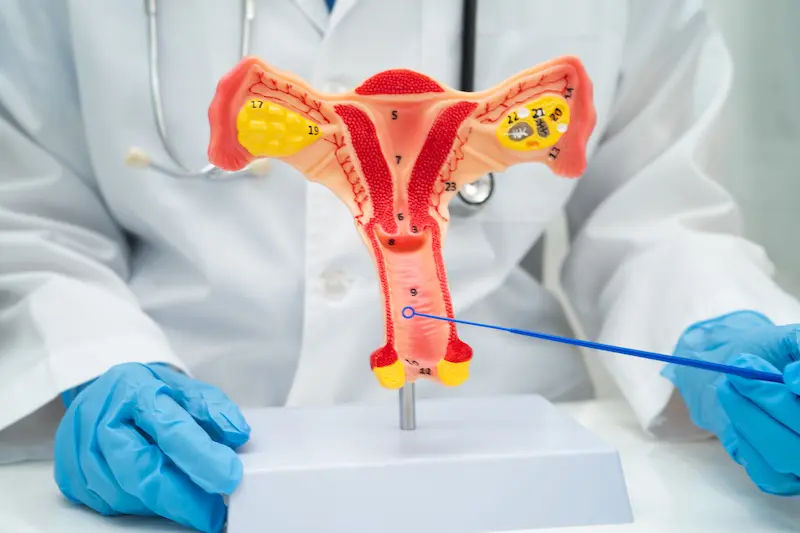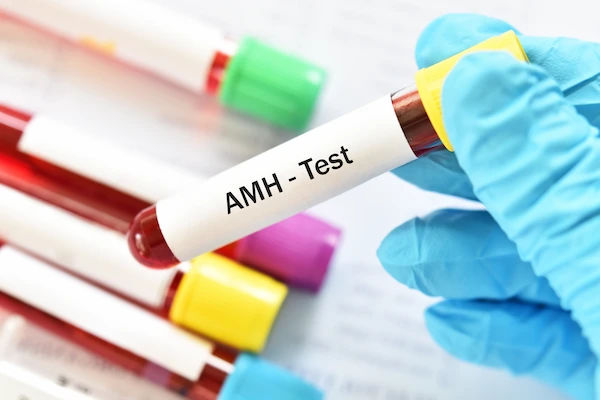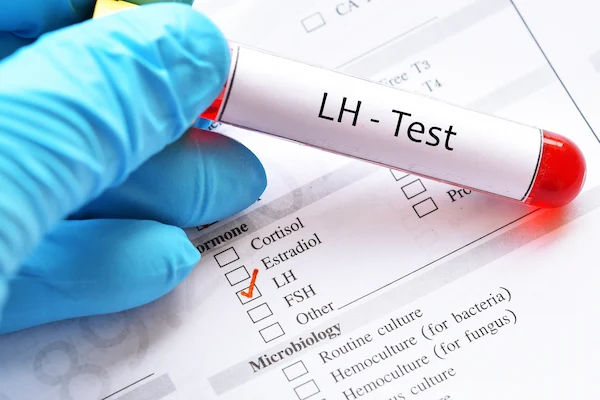PCOS Blood Test Checklist for Women with Irregular Periods
Struggling with irregular periods or unexplained symptoms? Discover the essential PCOS blood tests—including hormone, insulin, thyroid, and AMH panels—that help diagnose the root cause.

Written by
Last updated on 21st Jul, 2025

You’ve probably heard the term PCOS being thrown around, especially if you’ve been dealing with irregular periods. But how do you know if it’s really PCOS or something else? Hormonal imbalances can be tricky. They often show up as missed cycles, sudden weight changes, acne flare-ups, or unusual hair growth. The only way to get clear answers is through lab testing.
A PCOS test panel goes beyond just hormones. It evaluates multiple parameters like insulin levels, ovarian function, and thyroid health to confirm or rule out PCOS. Sometimes, even a transvaginal ultrasound may be recommended based on your blood work.
Getting tested not only helps you understand what’s behind the irregularity but also guides you toward the right treatment—whether that’s lifestyle changes, supplements, or medical support. In this guide, you’ll find a complete breakdown of the key hormone tests for PCOS, the ideal time to take them, and what to do with the results.
What Tests Confirm PCOS and Rule Out Others
When it comes to diagnosing PCOS, there isn’t just one test that gives you a definitive answer. Instead, your doctor will look at a combination of symptoms, hormone levels, and sometimes imaging results. That’s why a proper PCOS test panel includes multiple lab investigations. These tests help confirm the presence of PCOS, but also importantly, rule out other conditions that mimic its symptoms.
For example, an underactive thyroid or elevated prolactin levels can also cause irregular periods, weight gain, and fatigue. Similarly, high insulin levels or adrenal disorders can lead to excessive hair growth and acne—symptoms often blamed on PCOS but caused by something else.
To get a complete picture, your doctor may recommend certain tests, each of which targets a specific area of concern, from ovulation and ovarian reserve to blood sugar metabolism and thyroid function. The idea is to leave no stone unturned when trying to figure out why your cycles are irregular.
LH, FSH, Testosterone, Insulin and Thyroid Panels
Hormones influence everything from ovulation and energy levels to skin health and mood. When your periods are unpredictable, these tests help decode what your body is trying to tell you. Each test in a PCOS test panel checks a different function, making the diagnosis more precise and actionable.
LH is responsible for triggering ovulation. In PCOS, LH levels are often unusually high, which can disrupt the normal release of eggs and lead to cyst formation on the ovaries.
What it tells you:
- Whether your body is preparing to ovulate properly
- If the LH:FSH ratio is skewed, which is a common PCOS marker
- If excessive LH levels are behind irregular ovulation or missed periods
2. Follicle-Stimulating Hormone (FSH)
FSH helps follicles in your ovaries grow and mature. In women with PCOS, FSH may be lower than normal, which creates an imbalance with LH.
What it tells you:
- If your ovaries are developing eggs as they should
- Whether hormonal imbalance is affecting egg maturation
- Supports diagnosis when compared with LH levels
Though often labelled a "male hormone", women need small amounts of testosterone too. When levels are elevated, symptoms like facial hair, acne, and hair thinning often appear.
What it tells you:
- If your body is producing excess androgens
- Whether symptoms like acne or hirsutism are hormonally driven
- Confirms one of the key diagnostic features of PCOS
Many women with PCOS have insulin resistance, even if their blood sugar levels appear normal. This test checks how much insulin your body is producing to manage glucose.
What it tells you:
- If insulin resistance is present
- Why weight gain or cravings might be worsening
- Whether your risk of Type 2 diabetes is increasing
5. Thyroid Profile – Total T3, T4, TSH
Thyroid problems can cause menstrual delays, fatigue, weight issues, and mood swings. Since these symptoms overlap with PCOS, ruling out thyroid dysfunction is essential.
What it tells you:
- Whether hypothyroidism or hyperthyroidism is causing your symptoms
- If your metabolism is slower than expected
- Whether treatment for PCOS needs to include thyroid correction
6. Anti-Müllerian Hormone (AMH)
AMH gives an idea of your ovarian reserve, or how many eggs are left in your ovaries. In PCOS, this number is usually higher than normal due to many small, undeveloped follicles.
What it tells you:
- If you have a higher-than-usual egg reserve, common in PCOS
- How your ovaries are functioning in terms of follicle development
- Whether PCOS is likely even if other hormone levels are borderline
Get The Tests To Check If You Have PCOD
Ideal Timing Based on Menstrual Cycle
When you take your tests matters. Hormone levels shift throughout your cycle, and incorrect timing can affect accuracy. If your periods are regular, timing is simple. For irregular or missed cycles, your doctor may advise testing after inducing a bleed.
Day 2 to Day 5 of your cycle
Hormones are most stable at this time.
Recommended tests:
- FSH
- LH
- Testosterone – Total
- AMH
- Thyroid Profile
Anytime (fasting sample preferred)
- Insulin – Fasting
If you haven’t had a period in over a month, your doctor might start you on a progesterone course to bring on a bleed, then schedule tests during the early days of that cycle.
A pelvic or transvaginal ultrasound, often used to check for polycystic ovaries, is also best done during this early phase. Still, your doctor will tailor the timing based on your symptoms and test history.
What to Do With the Results (Action Plan)
Once your reports are in, the next step is understanding what they mean and how to act on them. Don’t just glance at the numbers. Even if your levels fall within the "normal" range, PCOS often involves patterns and ratios that only a doctor can properly interpret.
Here’s how to move forward:
- High LH:FSH ratio or raised AMH
Likely points to PCOS. Your doctor may suggest cycle tracking, weight management, or hormonal therapy. - Elevated testosterone
Can explain acne, hair growth, or mood swings. Anti-androgen medications or diet changes might help. - High insulin or signs of resistance
You may need a low-GI diet, more physical activity, or insulin-sensitising drugs like metformin. - Abnormal thyroid levels
Hypothyroidism needs treatment first, as it can mimic or worsen PCOS symptoms.
These results form the foundation of your treatment plan. Whether you're trying to regulate periods, lose weight, improve fertility, or just feel more in control—your lab tests point the way.
And remember, PCOS isn’t one-size-fits-all. You don’t need to tick every box to qualify for support. Early action makes a big difference.
Book PCOS Profiles via Apollo 24|7
If you're unsure where to begin, Apollo 24|7 makes it easy to get started. You can book individual tests or choose curated PCOS test panels that combine all the essentials—hormones, insulin, thyroid, and ovarian markers—in one convenient package.
Why book with Apollo?
- Tests are reviewed and approved by top endocrinologists and gynaecologists
- Home sample collection available across multiple cities
- Digital reports with quick turnaround and easy access
- Option to consult Apollo doctors post-results for guidance
Whether you're looking for a full hormone test for PCOS or just want to check your insulin and AMH levels first, Apollo has reliable diagnostic options tailored for women with irregular cycles.
Taking the first step toward answers doesn’t need to be complicated. With trusted lab support and clinical follow-through, you can focus on what matters most—feeling better, sooner.
Get The Tests To Check If You Have PCOD
₹2029(₹5072)60% off
₹709(₹1772)60% off
₹1139(₹2847)60% off
₹699(₹1748)60% off
₹699(₹1748)60% off
₹979(₹2447)60% off




.webp)

